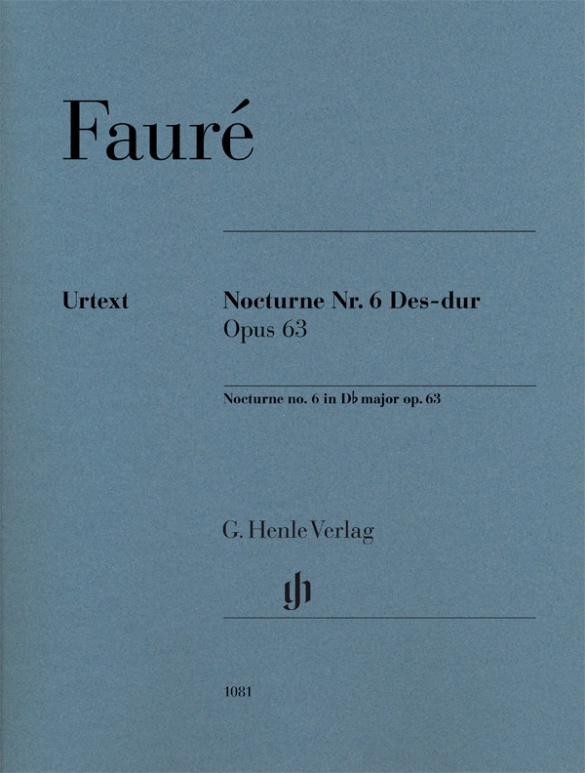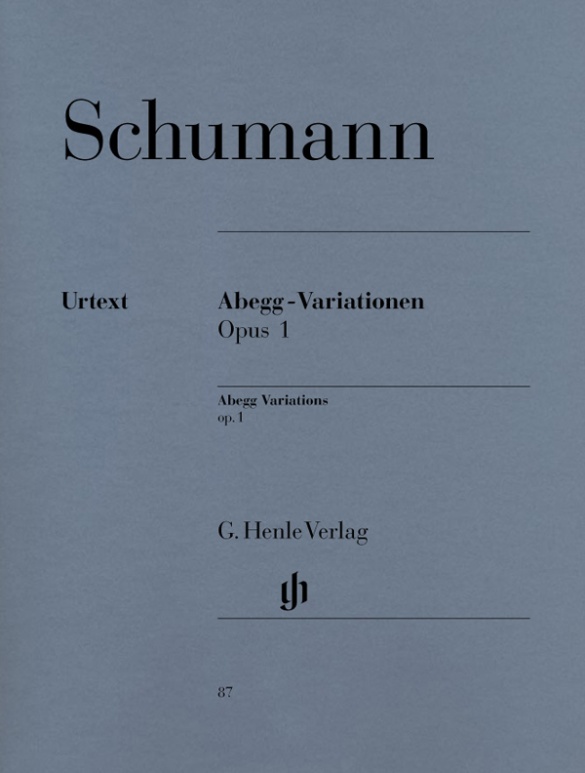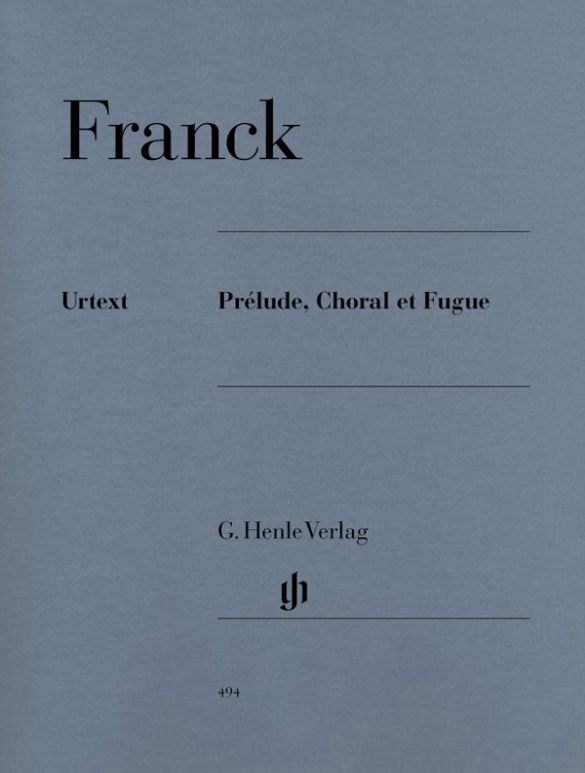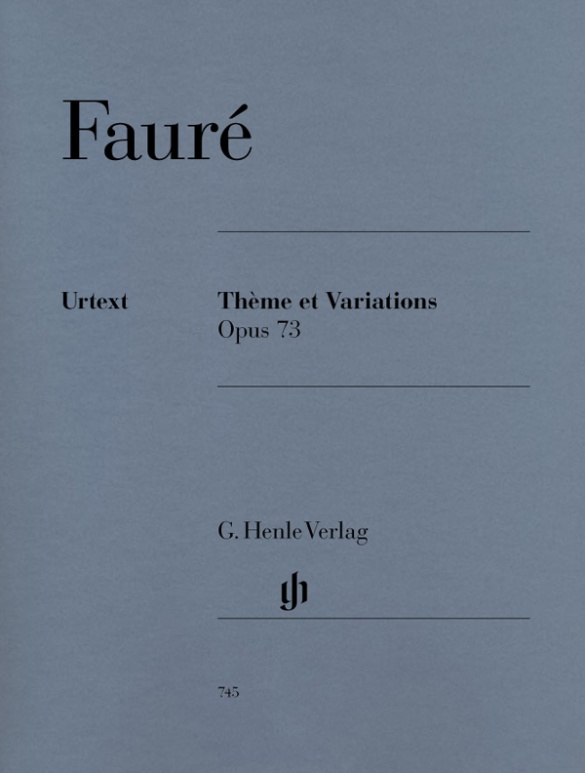

Gabriel Fauré
Thème et Variations op. 73 for Piano
At last Fauré’s brilliant masterpiece is available in a modern urtext edition! This vibrant set of variations was premièred in London’s St James Hall on 10 December 1896 and appeared in print the following year in Paris and London. No autographs or manuscript copies of it have survived. “Thème et Variations“ pays homage to the German tradition, taking Robert Schumann’s “Symphonic Etudes“ in particular as a model for its form and rhythmic vitality.
mws-henle.cms.title-works.headline
mws-henle.cms-product-detail.composer-headline
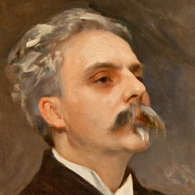
Gabriel Fauré
Representative exponent of French music around 1900. His creative work is centered around the art song, piano music (nocturnes, barcarolles, impromptus, valse-caprice), and chamber music – alongside other genres.
| 1845 | Born in Pamiers (Ariège) on May 12, the son of a primary school teacher. |
| 1854–65 | Attends the École de musique classique et religieuse (founded by L. Niedermeyer), where liturgical musicians were educated; lessons with Saint-Saëns (from 1861). |
| 1866–70 | Organist at the church of Saint-Sauveur in Rennes. |
| 1871 | After occupying various organist positions in Paris, he becomes assistant organist to Saint-Saëns at Saint-Sulpice. He numbers among the founding members of the Société nationale de musique. Performances of his works in their concerts. |
| 1874 | Premiere of his “Suite d’orchestre” in F major (“Symphony No. 1”), which is a compilation of existing pieces. |
| 1875/76 | Violin Sonata No. 1 in A major, Op. 13. |
| 1876–79 | Piano Quartet No. 1 in C minor, Op. 15 |
| 1877 | Maître de chapelle at Paris’s Église de la Madeleine. |
| 1876/78 | Premiere of his choral work “Les Djinns,” Op. 12. |
| from 1879 | Attends performances of Wagner’s music; in his own compositions he distances himself from Wagner. |
| 1885 | Premiere of his Symphony No. 2 in D minor, later destroyed. |
| 1887/88 | Requiem, Op. 48. |
| 1891 | “Cinq Mélodies ‘de Venise’,” Op. 58, on texts by Verlaine. |
| 1892–94 | “La bonne chanson,” Op. 61, on texts by Verlaine. |
| 1896 | Successor to Dubois at the Madeleine. He conducts a composition class at the Paris Conservatoire. |
| 1900 | Premiere of the tragédie lyrique “Prométhée,” Op. 82. |
| 1905–20 | Director of the Conservatoire. |
| 1909 | President of the Société musicale indépendante. |
| 1913 | Premiere in Monte Carlo of his opera “Pénélope.” |
| 1919 | Song cycle, “Mirages,” Op. 113, with clear features of his modernist late style. |
| 1924 | Death in Paris on November 4. |
mws-henle.cms-product-detail.author-headline

Peter Jost (mws-henle.person.role.HERAUSGEBE)
Dr. Peter Jost, born in 1960 in Diefflen/Saar, read musicology, German and comparative studies at Saarland University in Saarbrücken. He did his PhD in 1988 with a thesis on Robert Schumann’s Waldszenen.
From November 1991 to April 2009 he was a research associate at the Richard Wagner Complete Edition in Munich, and since May 2009 has been an editor at G. Henle Publishers. His Urtext editions comprise predominantly French music of the 19th and 20th centuries, including works by Lalo, Saint-Saëns and Ravel.

Klaus Schilde (mws-henle.person.role.FINGERSATZ)
Prof. Klaus Schilde, born in 1926, spent his childhood in Dresden. There he was greatly influenced by Walter Engel, who taught him the piano (Kodaly method), composition and violin. From 1946–1948 he studied at the music conservatory in Leipzig with Hugo Steurer. After moving to the west in 1952 he studied with Walter Gieseking and Edwin Fischer, as well as with Marguerite Long, Lucette Descaves and Nadia Boulanger in Paris.
Schilde won numerous prizes. From 1947 onwards he gave concerts as a soloist and chamber musician on almost every single continent with renowned orchestras. He taught at the music conservatories in East Berlin Detmold, West Berlin, Munich, Tokyo (Geidai) and Weimar. From 1988–1991 he was President of the Staatliche Hochschule für Musik und Theater in Munich, where he also taught for decades as a professor. There are numerous radio and television broadcasts with Klaus Schilde as well as CD recordings. Schilde has contributed fingerings to almost 100 Henle Urtext editions.
Prof. Klaus Schilde passed away on 10 December, 2020.
Product Safety Informations (GPSR)

G. Henle Verlag
Here you can find the information about the manufacturer of the product.G. Henle Verlag e.K.
Forstenrieder Allee 122
81476 München
Germany
info@henle.de
www.henle.com
Die Variationen quellen über vor wunderbaren Einfällen und immer wieder neuen Wendungen. Ein Meisterwerk.
Piano News, 2004)推荐
autogenerated_cross_selling
本书目其他版本
本书目其他版本


